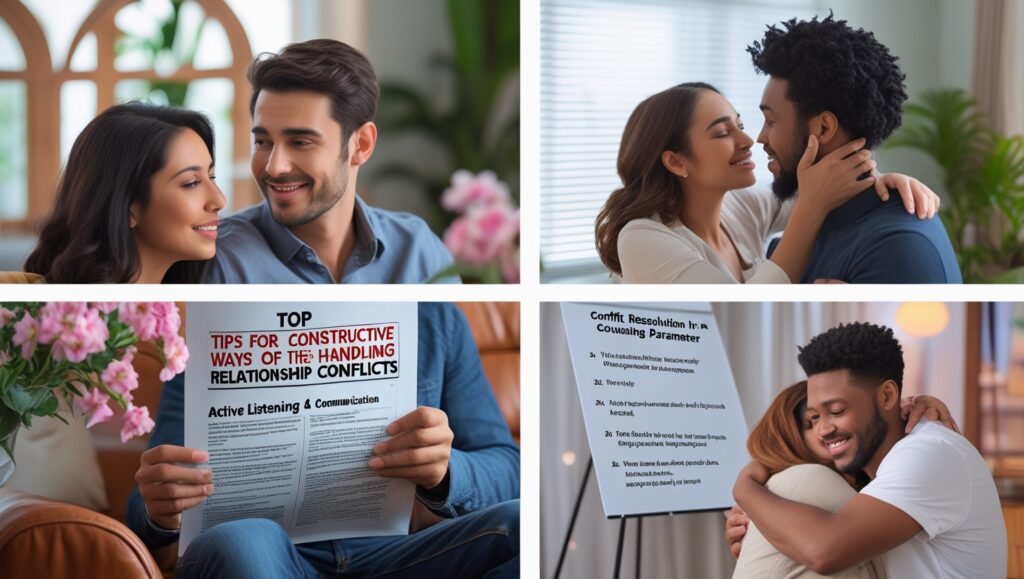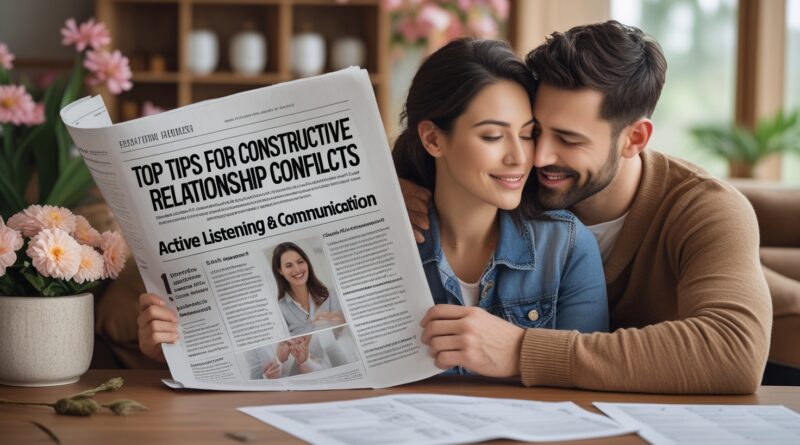Top Tips for Constructive Ways of Handling Relationship Conflicts
Conflicts in relationships are not all that bad, and not all of them spell that something has gone wrong. It’s all about how you cope with it. To many, conflicts seem to destroy everything; however, this can be the right time to bring you closer, understand deeper, and grow together. But in order to transform disagreements into fruitful conversations, there is a need to use proper strategies.
Whether one struggles with a tough time in communications or gets frustrated when arguing with a partner, this guide is for them. A couple, a therapist wanting advice to help your clients, or anyone simply interested in learning how to handle disagreements better-this practical advice will help you turn conflict into connection.
Why Learning to Manage Conflicts Matters
No relationship, no matter how strong, is free of disagreements. But what separates good relationships from bad is a mindset when there are conflicts-a resolve to solve the issue, not “win” for resolution. Poorly handled conflicts can lead to resentment, stress, and interpersonal distance. Conversely, dealing constructively with problems can build trust, respect, and harmony more significantly. Following are some of the common reasons that cause conflicts to escalate:
- Poor communication skills, including yelling, interrupting, use of blaming tone
- Avoidance of the issues
- Past traumas surfacing during an argument or unresolved issues
- Not being empathetic and not actively listening
- Misjudging motives or actions
The good news? Any person can learn to handle conflicts better with the right mindset and with the right tools.
Top Tips for Constructively Managing Relationship Conflicts
- Foster a Safe Space for Communication
Healthy conflict resolution begins with the creation of a safe, judgment-free environment. That means both partners feel respected in voicing their thoughts and emotions without the risk of being ridiculed or belittled.
The following ways establish a safe space:
- Chose the right time to talk, and do not begin with discussions when you are tired or stressed.
- Establish boundaries that maintain positivity within the conversation, for example, refraining from yelling, blaming, or interrupting.
- Affirm your regard for your partner’s perspective by using affirming language.
For example, saying something like “I can see where you’re coming from, and I’d like to understand more” demonstrates empathy and encourages open dialogue.

- Practice Active Listening
Most of us listen to respond, not to understand—and that’s where things often go wrong. Active listening involves fully hearing your partner’s concerns without interjecting, forming rebuttals, or becoming defensive.
Key tips for active listening:
- Maintain eye contact and nod to show engagement.
- Reflective listening affirms what you heard, such as, “What I hear you saying is that you felt disregarded when I called off over the weekend. Is that right?”
- Stop thinking of your points mentally and engage yourself in the present times.
When your partner feels heard, they also start giving the same amount of attention towards the speaker.
- Use “I” Statements Instead of “You” Statements
One of the quickest ways to escalate a conflict is by placing blame with accusatory language, such as “You never listen to me!” or “You always make everything about you!” This type of statement will immediately put your partner on the defensive.
Instead, focus on using “I” statements that express how your partner’s actions affect you. For example:
- Instead of “You don’t care about my feelings,” say, “I feel hurt when my concerns are dismissed.”
- Instead of “You’re making me angry,” say, “I feel frustrated because I think our priorities are not aligned.”
This simple yet powerful shift in frame transforms the tenor of the conversation, putting the spotlight on your feelings and not on blaming. 4. Time-Outs When Necessary
When conflicts become too heated, it’s okay to step away temporarily. Taking a break can prevent arguments from spiraling out of control and gives both partners time to cool off.
Here’s how to pause effectively:
- Clearly communicate the need to step away: “I feel too overwhelmed to continue talking productively right now. Can we take a break and revisit this in an hour?
- Use the time-out to reflect on your feelings, not to dwell on your anger or rehearse your comebacks.
- Commit to returning to the discussion when the emotions have simmered down.
Time-outs are about de-escalating, not avoiding. Make sure to circle back to the conversation when you’re both ready.
- Work Together on Solutions
Conflicts Productively resolved should strive for collaboration rather than compromise. Although compromise may seem fair and reasonable at first, it too frequently leaves both parties unsatisfied. Collaboration works toward solutions where the needs of both partners are fully considered and met.
Consider rephrasing “How can we fix this?” to “What can we do together to make sure we’re both heard and valued?”
Some things you can do:
- Brainstorm possible solutions before choosing one.
- Delegate responsibilities according to strengths or preferences.
- Regularly follow up on whether the agreed-upon solutions are working.

- Understand Triggers and Patterns
Most conflicts turn out to be circular because the real issues never get resolved. It’s important to understand what your triggers are and what patterns drive you.
How to find these triggers:
- Take the time to reflect on the earliest moments of your habits during a conflict. Are finances, family, or scheduling repeating sources of tension?
- Emotional Baggage: Past emotional experiences can shape current reactions.
- Professional Help: A therapist can be very instrumental in helping a couple unpack their deeper triggers.
Having an understanding of these dynamics allows a couple to learn how to focus on the root of the problems rather than just its symptoms.
- Appreciate Each Other’s Perspectives
Even when one disagrees with the perspective of their partner, it validates their feelings, showing respect for their experience. Something as simple as, “I didn’t think about it that way; thank you for pointing it out,” can de-escalate tensions and build mutual trust.
Actually, making steps toward seeing the argument through his glasses nurtures not only empathy but also mutually beneficial solutions.
- Celebrate Success
Conflict resolution improves with time and effort. Celebrate each small success or every step forward in conflict resolution. Whether it is having a peaceful discussion on a topic that was previously tense or the resolution of an argument quickly, every step forward is a positive achievement.
Gratitude for growth reinforces good behavior over time in relationships.
Strengthen Your Relationship Starting Today
Conflict is a part of being in a relationship, but that doesn’t mean it has to be ongoing frustration. By fostering open communication and building empathy while looking out for a solution together, you can turn disagreements into means to get closer to your partner.
If these steps are hard for you to apply, or if you would like personalized advice, you may want to seek professional relationship therapy or communication workshops. Sometimes, having a professional expert mediate tough conversations can bring incredible clarity and healing.
Conflict does not define a relationship-how you handle it does. Start practicing these tips today, and you’ll see the positive impact they can make for you and your partner.
For more relationship insights, or seeking a personal counselor for yourself, find a licensed relationship counselor to help. This may be the first step to your dream partnership.

